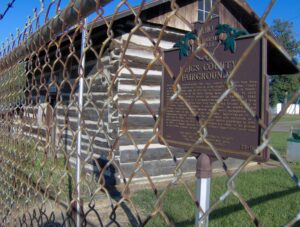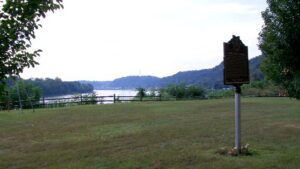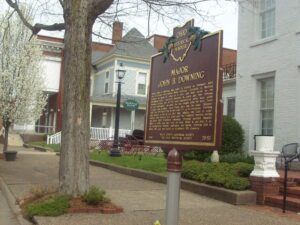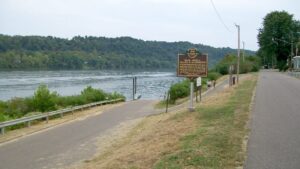, OH
Situated in an agriculturally rich area, county fairs have long been a significant tradition and event in Meigs County. The Meigs County Agricultural Society held its first fair on October 22, 1851, in Middleport and its second at the Rock-Spring Hotel on October 31, 1852. Subsequent fairs occurred around the county until March 14, 1868, when the first section of a permanent location was purchased from Leonard and Jane Carleton near Rock Springs and became known as the Meigs County Fairgrounds. A popular place, the nearby natural springs, exemplified by the historic stone-carved springhouse, once supplied water to the grounds and community. Improvements to the fairgrounds included expanding the one-third mile racetrack to a half-mile in 1889, constructing the unique curved grandstand in 1890, and reconstructing the 1829 Foster-Jenkinson log cabin on the grounds in 1987. A single barrack from the Civilian Conservation Corps camp of the 1930s remains in use.
, OH
James Edwin Campbell was born on September 28, 1867, in the Kerr’s Run area of Pomeroy to James and Letha Campbell. He graduated from Pomeroy High School with the class of 1884. After graduation, Campbell taught in various parts of Meigs County. Campbell achieved notoriety as an African American poet, editor, author of short stories, and educator. He began his writing in 1887 with the work Driftings and Gleanings. During the 1880s and 1890s, he wrote regularly for daily newspapers in Chicago and was employed on the literary staff of the Chicago Times-Herald. His dialect poetry attracted wide-spread popularity and he published a collection of his best works, Echoes From the Cabin and Elsewhere. Campbell was installed as the first president of the West Virginia Colored Institute (West Virginia State University), serving in the capacity from 1891 to 1894. James Edwin Campbell died in Pomeroy on January 26, 1896.
, OH
Major John B. Downing was born in Rutland in February 1834, son of Rodney and Marian Black Downing. Educated at Marietta College, he spent 27 years as a pilot and boat owner on the Mississippi River, operating between St. Louis and New Orleans. Downing became one of the most experienced river boat pilots on the Mississippi. As such, he was sought after by Mark Twain to teach him piloting. Later Twain gave him the name “Alligator Jack” and referenced him in his book Life on the Mississippi. Downing also played a role in the Civil War, piloting the fleet in cooperation with General U.S. Grant past the Vicksburg fortress during the famed 1863 Vicksburg Campaign. Downing married Romaine Miller in 1868, and they had two sons, Miller R. and John B. Jr. An accomplished violinist, marksman, and hunter, Downing died in March 1914 and was buried in Middleport Hill Cemetery.
, OH
Middleport native William Outerbridge (1906-1986) initiated the first shots of American involvement in World War II at 6:37 a.m. prior to the Japanese attack on Pearl Harbor on December 7, 1941. Outerbridge was commander of the destroyer USS Ward, which engaged and attacked a Japanese midget submarine as it attempted to slip into Pearl Harbor at Hawaii. He reported the action and the sinking of the submarine before the attack by Japan. In 2005, the submarine was found and the shell holes in the coning tower confirmed Outerbridge’s report. During WWII he went on to command the USS O’Brien, which served in support of the Normandy D-Day Landings on the beaches and at the port of Cherbourg. He then served in the Pacific theater until the end of the war supporting American efforts to take back islands from the Japanese. He later commanded the cruiser USS Los Angeles.





